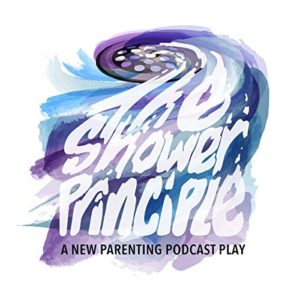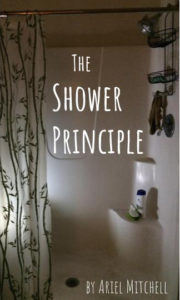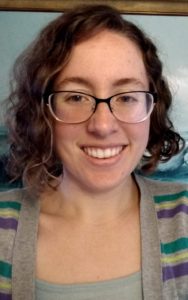 Ariel Mitchell introduces her new dramatic podcast The Shower Principle. An earlier theatrical production of The Shower Principle was a 2018 AML Drama Award finalist.
Ariel Mitchell introduces her new dramatic podcast The Shower Principle. An earlier theatrical production of The Shower Principle was a 2018 AML Drama Award finalist.
The prompt I was given for this blog post was the issues of transforming a play into a podcast. If you are a writer reading this in hopes of getting some tricks for transforming your theatrical script where the conflict is written into the images created by bodies interacting physically on a stage… this may not be the blog post for you. It sounds like you have a great play. The Shower Principle was never a play. I mean, I called it that. I thought it was. I produced it as one. But it wasn’t a play. Not really. The conflict wasn’t in the physical interaction between people. The conflict is within the two characters imposed by a situational, inescapable presence: a crying newborn. This aspect of the script has proven very effective in showing me that this story always was a radio play (and it seems pretty effective in sending parents spiraling into PTSD newborn flashbacks). Once I figured out what the script actually was, the issue was simply making it happen.
When do you know what a story is? Does it happen the moment you catch an idea? When you delve deep into character? Outline the plot? Sometimes it takes me years to figure out what a story wants to be. Sometimes it takes a worldwide pandemic.
I had my first child in 2016. I had finished my Master’s degree the year before. I was still getting my footing, figuring out what kind of a writer I was going to be. I decided motherhood would become my day job. But with two jobs with such undefined boundaries (writer and mother), one job – the survival of infants and personal sanity – won out. Writing, unprotected and unprofitable, became relegated to stolen moments between feeding, bouncing, and attempting to coax a baby to sleep. I began The Shower Principle very slowly as a lifeline to store thoughts and literally protect who I knew I was.
 I produced the first one woman show version of the play in 2018 in NYC but went immediately back to the drawing board. It was too isolated, too much of the vomit diary it started as. It didn’t feel right on stage. I added the husband character and a new concept. It became more than it was but I still struggled to see it on stage. It went into a drawer.
I produced the first one woman show version of the play in 2018 in NYC but went immediately back to the drawing board. It was too isolated, too much of the vomit diary it started as. It didn’t feel right on stage. I added the husband character and a new concept. It became more than it was but I still struggled to see it on stage. It went into a drawer.
Then in March of 2020, the pandemic hit. It opened a door for a stay-at-home mom masquerading every so often as playwright to feel encouraged to produce from home. I was able to see so much more theater without a babysitter. Opportunities were popping up for submissions for virtual performances. It was like the limits I felt on the balance of my home/work life were lifted. The world was living in the quarantine I had felt that I had been living in since 2016 with my now children-centered life. One submission in particular stuck out to me. Blindspot Collective’s Walks of Life called for 10 minute stories that you could listen to on a quarantine walk. It would be as if you were listening to the people inside of the houses you were passing by. This was The Shower Principle, the crux of which takes place in the mind of a new mother taking a shower, a setting no one is ever privy to, a sacred space. I had found where I believed this story belonged. It was a podcast!
In each of my shows, I try to challenge myself, see if I can stretch my craft. I live in dialogue. I love it. I’ve always been a voracious listener. I hear more than see things, so a slice of life, minimalistic discussion, fight, or entreaty is my happy place. The Shower Principle is about the isolation of new parents. I built the inability to communicate between wife and husband, mother and father, into the structure of the piece. It is monologues. Excruciatingly, wrought out, stream of consciousness, contents-of-the-heart monologues. The characters don’t talk to each other until the last act. There wasn’t another character to escape to. This structure forced me to grow as a writer and as a person. I learned things about my characters and myself by confining us to our thoughts. It also made the play incredibly simple to adapt to a podcast format. The story knew what it wanted to be. I just needed a worldwide pandemic to show me.
Once I knew what it was, a podcast play, the issues that arose were very similar to self-producing: (1) find a venue, (2) find actors, (3) rehearse, or in this case edit, and (4) market it. (This is overly simplistic and I am stumbling around doing all of this in the stolen early morning hours while my husband is working for the Department of Health and Human Services in the middle of a global pandemic response, so please be forgiving of my experience and know I don’t profess to be an expert in any way. I’d do a lot differently for my next podcast play.).
I will now go through my process.
1. Venue
So… I didn’t listen to podcasts before making one. I mean I wasn’t a podcast listener until I wanted to make a podcast. And then I listened. A lot. I listened to parenting podcasts that would be similar to my play, fictional podcasts, and just podcasts that interested me. I reached out to friends who have been making podcasts for years (Shoutout to @ScarsWeShare) and dizzily searched through the sites that would act as platforms to stream my finished podcast (Buzzsprout was particularly helpful). I created a name for my podcast complete with what I hoped were searchable keywords and licensed the domain name (Check out showerprinciple.com!). The biggest challenge was the amount of information to sort through. It came down to looking past being overwhelmed, making a choice, and moving forward.
2. Actors
I was scrolling through Facebook one day and came across the pregnancy announcement of an actor friend and her husband, also an actor. I asked, drew up a contract, and the rest was history. The Jeffries were such an amazing blessing to this project. I was struggling to figure out how to record the one episode with dialogue when we were all quarantining and two talented actors with a background in vocal performance and recording, with their own equipment, and quarantining together came onto my radar! I mean talk about a miracle. Also they were on the cusp of dealing with the situation the podcast play discusses. They are fantastic. Please check them out here:
Heather: https://www.
Andrew: https://www.andrewdjefferies.
or on the podcast!
3. Editing
Once they were finished recording, it was all in my court again. Editing (for me) is just hours, hours, and more HOURS on Garageband. Following the script, making sure the sound effects line up. A friend helped with the music and a different friend designed the logo. The challenge here was just putting in the time to understand a software I was unfamiliar with and develop a new skill; getting what I heard in my head onto an mp3 file. Youtube is helpful.
4. Marketing
You should go listen! Seriously! Try it! So… done? That’s this section. 😉
Basically, I’m still marketing and will be until the end of time! (Yay/Boo the other unspoken aspect of being a writer!) I started by building the website (thank you Wix.com), making a Facebook page (pretty straightforward), and getting a podcast-specific email. One of the major challenges was figuring out how to pay my actors/composer. We settled on a Patreon Page, which I am still figuring out. Maybe you’ll find a better way? I don’t get paid in any sphere in which I work, as a stay-at-home-mother or self-producing free-lance writer. It’s been a challenge to insist that creating this matters. But it does. To me and for me. This play helped me gain skills in all aspects of my life that I wouldn’t have otherwise. I don’t regret doing it for free, I just hope and wish my collaborators could get the payment they deserve. Getting people to listen has not been easy (it’s only been a little over a month!). It’s basically word of mouth. I don’t know if we will ever turn a profit from this, but I count it a huge success that it’s out there; it exists, and it finally is what I believe it wants to be. And I know where my next step will be. My next podcast play will be another step forward. I hope.
Overall, in my experience making a play into a podcast play, I was surprised how straightforward it was. Sometimes you just have to find where you fit.
 Ariel Mitchell hails from a small island in the Chesapeake Bay. She earned her BA in Playwriting in 2013 from Brigham Young University and her MFA in Musical Theatre Writing in 2015 from New York University. She has written several plays including Give Me Moonlight, inspired by Scotty’s Castle in Death Valley, which was performed in February 2020 in Baltimore, and A Second Birth, about an Afghan girl who was raised as a boy, for which she was awarded the KCACTF Harold and Mimi Steinberg 2013 National Student Playwriting Award, a Vera Hinckley Mayhew Award, and an AML Drama Award. Her MFA thesis was MORMONish (book and lyrics), a semi-autobiographical musical dramedy, which tells the story of a half Mormon, half Jewish girl searching for where she fits in a family where everyone believes something different. Her play The Shower Principle was a 2018 AML Drama Award finalist. As well as writing for stage, TV, and screen, she has also dramaturged many productions including The Completely Fictional — Utterly True — Strange Final Tale of Edgar Allan Poe at Centerstage in Baltimore, Steel Magnolias at the Echo Theatre in Provo, Utah, What the Bellhop Saw at the Utah Repertory Theater in Murray, Utah, and Selections from Gone Missing and The Cleverest Thief, a devised piece, at BYU.
Ariel Mitchell hails from a small island in the Chesapeake Bay. She earned her BA in Playwriting in 2013 from Brigham Young University and her MFA in Musical Theatre Writing in 2015 from New York University. She has written several plays including Give Me Moonlight, inspired by Scotty’s Castle in Death Valley, which was performed in February 2020 in Baltimore, and A Second Birth, about an Afghan girl who was raised as a boy, for which she was awarded the KCACTF Harold and Mimi Steinberg 2013 National Student Playwriting Award, a Vera Hinckley Mayhew Award, and an AML Drama Award. Her MFA thesis was MORMONish (book and lyrics), a semi-autobiographical musical dramedy, which tells the story of a half Mormon, half Jewish girl searching for where she fits in a family where everyone believes something different. Her play The Shower Principle was a 2018 AML Drama Award finalist. As well as writing for stage, TV, and screen, she has also dramaturged many productions including The Completely Fictional — Utterly True — Strange Final Tale of Edgar Allan Poe at Centerstage in Baltimore, Steel Magnolias at the Echo Theatre in Provo, Utah, What the Bellhop Saw at the Utah Repertory Theater in Murray, Utah, and Selections from Gone Missing and The Cleverest Thief, a devised piece, at BYU.
